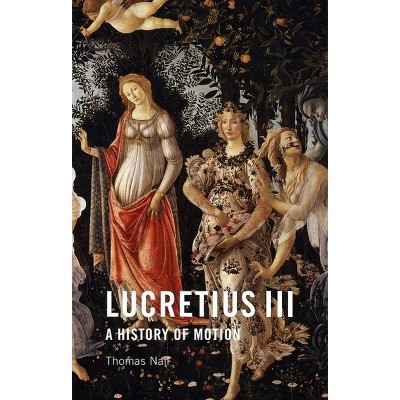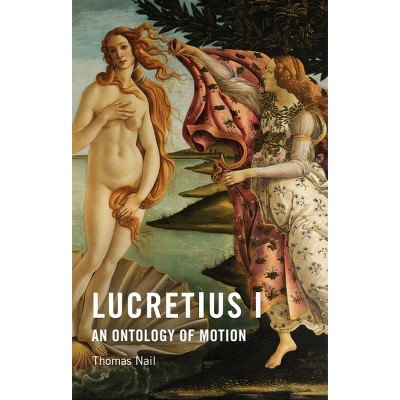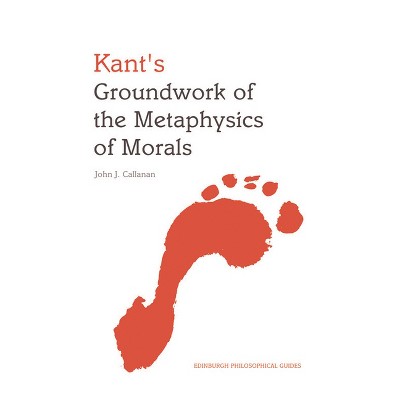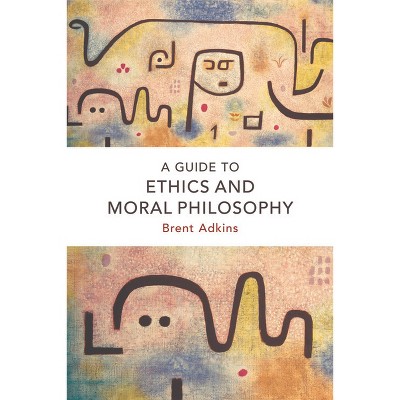$145.00 when purchased online
Target Online store #3991
About this item
Highlights
- Human suffering, the fear of death, war, poverty, ecological destruction and social inequality: almost 2,000 ago Lucretius proposed an ethics of motion as simple and stunning solution to these ethical problems.
- About the Author: Thomas Nail is Associate Professor of Philosophy at the University of Denver.
- 240 Pages
- Philosophy, Ethics & Moral Philosophy
Description
About the Book
Human suffering, the fear of death, war, poverty, ecological destruction and social inequality: Thomas Nail shows that Lucretius proposed an ethics of motion as simple and stunning solution to these ethical problems in his first-century BC didactic poem De Rerum Natura.Book Synopsis
Human suffering, the fear of death, war, poverty, ecological destruction and social inequality: almost 2,000 ago Lucretius proposed an ethics of motion as simple and stunning solution to these ethical problems. Thomas Nail argues that Lucretius was the first to locate the core of all these ethical ills in our obsession with stasis, our fear of movement and our hatred of matter. Instead of trying to transcend nature with our minds, escape it with our immortal souls and dominate it with our technologies, Lucretius was perhaps the first in the Western tradition to forcefully argue for a completely materialist, immanent and naturalistic ethics based on moving well with and as nature. If we want to survive and live well on this planet, Lucretius taught us, our best chance is not to struggle against nature but to embrace it and facilitate its movement.From the Back Cover
PPC spine 17mm, 256 x 333mm Cover sine 13mm, 216 x 289mm 'With Lucretius II, Thomas Nail continues his project of re-reading Lucretius' De rerum natura in a startlingly new fashion - as a foundational text in the philosophy of movement. The results of Nail's labour are breathtaking: traditional pieties of scholarship fall by the wayside, replaced by a Lucretius truly of and for the twenty-first century.' Wilson Shearin, University of Miami More than just a study of Lucretius, Nail provides a stunning reading of an already fascinating philosopher. Nail's originally and beautifully composed account of motion generates an ethics worthy of the twenty-first century, allowing us to think of instability as an opportunity for thinking our world anew.' Claire Colebrook, Penn State University An ancient ethics for modern life Suffering, the fear of death, war, ecological destruction, and social inequality are urgent ethical issues today as they were for Lucretius. Thomas Nail argues that Lucretius was the first to locate the core of all these ethical ills in our obsession with stasis, our fear of movement, and our hatred of matter. Almost two thousand years ago Lucretius proposed a simple and stunning response to these problems: an ethics of motion. Instead of trying to transcend nature with our minds, escape it with our immortal souls, and dominate it with our technologies, Lucretius was perhaps the first in the Western tradition to forcefully argue for a completely materialist and immanent ethics based on moving with and as nature. If we want to survive and live well on this planet, Lucretius taught us, our best chance is not to struggle against nature but to embrace it and facilitate its movement. Thomas Nail is an Associate Professor of Philosophy at the University of Denver. He is the author of Lucretius I: An Ontology of Motion. Cover image: Primavera, Sandro Botticelli, 1482 Cover design: [EUP logo] edinburghuniversitypress.com ISBN: 978-1-4744-6663-9 BarcodeReview Quotes
More than just a study of Lucretius, Nail provides a stunning reading of an already fascinating philosopher. By attending carefully to Lucretius's poetics Nail opens an alternative history of philosophy that makes sense of the turbulent present. Rather than a world and beings that undergo motion, motion provides a way of accounting for the genesis of the world. Nail's originally and beautifully composed account of motion generates an ethics worthy of the twenty-first century, allowing us to think of instability as an opportunity for thinking our world anew.--Claire Colebrook, Penn State University
Nail's approach to Lucretius' philosophy is quite successful in defining ethics of motion and correlating ethics with life, death, knowledge, aesthetics, and ecology. The methodology, the honorifics, and the structure of Lucretius II: An Ethics of Motion help readers follow the narration and rediscover Lucretius as an ancient philosopher in a combination of the contemporary perspective. I offer people to read Lucretius II: An Ethics of Motion without a doubt if they have concerns about humanity's applications of nature and life itself from an ethical questioning. After reading this book, readers will have new ways of criticizing motion through a philosophical posthumanist philosophy.--Didem Yilmaz "Journal of Posthumanism"
With Lucretius II, Thomas Nail continues his project of re-reading Lucretius' De rerum natura in a startlingly new fashion--as a foundational text in the philosophy of movement. Here Nail, in his own words, 'unfolds another dimension' of Lucretius' text, offering through close-reading and translation of the Latin original a compelling, contemporary ethics and aesthetics of movement. The results of Nail's labor are breathtaking: traditional pieties of scholarship (such as Lucretius' slavish devotion to Epicurus or Epicurean ethics) fall by the wayside, replaced by a Lucretius truly of and for the twenty-first century.--Wilson H. Shearin, University of Miami
About the Author
Thomas Nail is Associate Professor of Philosophy at the University of Denver. He is the author of Lucretius I: An Ontology of Motion (Edinburgh University Press, 2018), Being and Motion (Oxford University Press, 2018), Returning to Revolution: Deleuze, Guattari and Zapatismo (Edinburgh University Press, 2012), The Figure of the Migrant (Stanford University Press, 2015) and Theory of the Border (Oxford University Press, 2016).Dimensions (Overall): 8.5 Inches (H) x 5.5 Inches (W) x .56 Inches (D)
Weight: .94 Pounds
Suggested Age: 22 Years and Up
Number of Pages: 240
Genre: Philosophy
Sub-Genre: Ethics & Moral Philosophy
Publisher: Edinburgh University Press
Format: Hardcover
Author: Thomas Nail
Language: English
Street Date: April 14, 2020
TCIN: 1004201184
UPC: 9781474466639
Item Number (DPCI): 247-26-2134
Origin: Made in the USA or Imported
If the item details above aren’t accurate or complete, we want to know about it.
Shipping details
Estimated ship dimensions: 0.56 inches length x 5.5 inches width x 8.5 inches height
Estimated ship weight: 0.94 pounds
We regret that this item cannot be shipped to PO Boxes.
This item cannot be shipped to the following locations: American Samoa (see also separate entry under AS), Guam (see also separate entry under GU), Northern Mariana Islands, Puerto Rico (see also separate entry under PR), United States Minor Outlying Islands, Virgin Islands, U.S., APO/FPO
Return details
This item can be returned to any Target store or Target.com.
This item must be returned within 90 days of the date it was purchased in store, shipped, delivered by a Shipt shopper, or made ready for pickup.
See the return policy for complete information.
Trending Poetry


$10.44
MSRP $18.99
Buy 1, get 1 50% off select books, games & more
4.9 out of 5 stars with 416 ratings


$16.48 - $17.48
Buy 1, get 1 50% off select books, games & more
4.7 out of 5 stars with 479 ratings


$13.48 - $26.49
was $17.99 - $32.99 New lower price
Buy 1, get 1 50% off select books, games & more
4.6 out of 5 stars with 26 ratings






